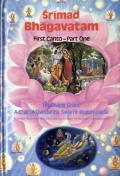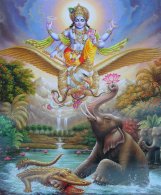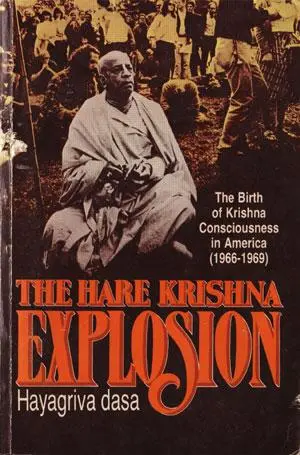The sense of a separated existence from Kṛṣṇa is called māyā (mā-not, yā-this).
People in general, especially in this age of Kali, are enamored by the external energy of Kṛṣṇa, and they wrongly think that by advancement of material comforts every man will be happy. They have no knowledge that the material or external nature is very strong, for everyone is strongly bound by the stringent laws of material nature. A living entity is happily the part and parcel of the Lord, and thus his natural function is to render immediate service to the Lord. By the spell of illusion one tries to be happy by serving his personal sense gratification in different forms which will never make him happy. Instead of satisfying his own personal material senses, he has to satisfy the senses of the Lord. That is the highest perfection of life. The Lord wants this, and He demands it. One has to understand this central point of Bhagavad-gītā. Our Kṛṣṇa consciousness movement is teaching the whole world this central point, and because we are not polluting the theme of Bhagavad-gītā As It Is, anyone seriously interested in deriving benefit by studying the Bhagavad-gītā must take help from the Kṛṣṇa consciousness movement for practical understanding of Bhagavad-gītā under the direct guidance of the Lord. We hope, therefore, that people will derive the greatest benefit by studying Bhagavad-gītā As It Is as we have presented it here, and if even one man becomes a pure devotee of the Lord we shall consider our attempt a success.
The Kṛṣṇa consciousness movement is essential in human society, for it offers the highest perfection of life. How this is so is explained fully in the Bhagavad-gītā. Unfortunately, mundane wranglers have taken advantage of Bhagavad-gītā to push forward their demonic propensities and mislead people regarding right understanding of the simple principles of life. Everyone should know how God or Kṛṣṇa is great, and everyone should know the factual position of the living entities. Everyone should know that a living entity is eternally a servant and that unless one serves Kṛṣṇa one has to serve illusion in different varieties of the three modes of material nature, and thus perpetually one has to wander within the cycle of birth and death; even the so-called liberated Māyāvādī speculator has to undergo this process. This knowledge constitutes a great science, and each and every living being has to hear it for his own interest. (From the preface to the Bhagavad-gita As It Is)
Bhagavad-gita As It Is – Macmillan 1972 Edition
By His Divine Grace A.C. Bhaktivedanta Swami Prabhupada
Chapter 5, Text 29
bhoktāraṁ yajña-tapasāṁ
sarva-loka-maheśvaram
suhṛdaṁ sarva-bhūtānāṁ
jñātvā māṁ śāntim ṛcchati
bhoktāram—beneficiary; yajña—sacrifices; tapasām—of penances and austerities; sarva-loka—all planets and the demigods thereof; maheśvaram—the Supreme Lord; suhṛdam—benefactor; sarva—all; bhūtānām—of the living entities; jñātvā—thus knowing; mām—Me (Lord Kṛṣṇa); śāntim—relief from material pangs; ṛcchati—achieves.
The sages, knowing Me as the ultimate purpose of all sacrifices and austerities, the Supreme Lord of all planets and demigods and the benefactor and well-wisher of all living entities, attain peace from the pangs of material miseries.
Purport
The conditioned souls within the clutches of illusory energy are all anxious to attain peace in the material world. But they do not know the formula for peace, which is explained in this part of the Bhagavad-gītā. The greatest peace formula is simply this: Lord Kṛṣṇa is the beneficiary in all human activities. Men should offer everything to the transcendental service of the Lord because He is the proprietor of all planets and the demigods thereon. No one is greater than He. He is greater than the greatest of the demigods, Lord Śiva and Lord Brahmā. In the Vedas the Supreme Lord is described as tam īśvarāṇāṁ paramaṁ maheśvaram. Under the spell of illusion, living entities are trying to be lords of all they survey, but actually they are dominated by the material energy of the Lord. The Lord is the master of material nature, and the conditioned souls are under the stringent rules of material nature. Unless one understands these bare facts, it is not possible to achieve peace in the world either individually or collectively. This is the sense of Kssna consciousness: Lord Kṛṣṇa is the supreme predominator, and all living entities, including the great demigods, are His subordinates. One can attain perfect peace only in complete Kṛṣṇa consciousness.
The Fifth Chapter of Bhagavad-gita is a practical explanation of Kṛṣṇa consciousness, generally known as karma-yoga. The question of mental speculation as to how karma-yoga can give liberation is answered herewith. To work in Kṛṣṇa consciousness is to work with the complete knowledge of the Lord as the predominator. Such work is not different from transcendental knowledge. Direct Kṛṣṇa consciousness is bhakti-yoga, and jñāna-yoga is a path leading to bhakti-yoga. Kṛṣṇa consciousness means to work in full knowledge of one’s relationship with the Supreme Absolute, and the perfection of this consciousness is full knowledge of Kṛṣṇa, or the Supreme Personality of Godhead. A pure soul is the eternal servant of God as His fragmental part and parcel. He comes into contact with māyā (illusion) due to the desire to lord it over māyā, and that is the cause of his many sufferings. As long as he is in contact with matter, he has to execute work in terms of material necessities. Kṛṣṇa consciousness, however, brings one into spiritual life even while one is within the jurisdiction of matter, for it is an arousing of spiritual existence by practice in the material world. The more one is advanced, the more he is freed from the clutches of matter. The Lord is not partial toward anyone. Everything depends on one’s practical performance of duties in an effort to control the senses and conquer the influence of desire and anger. And, attaining Kṛṣṇa consciousness by controlling the above-mentioned passions, one remains factually in the transcendental stage, or brahman-nirvāṇa. The eightfold yoga mysticism is automatically practiced in Kṛṣṇa consciousness because the ultimate purpose is served. There is gradual process of elevation in the practice of yama, niyama, āsana, pratyāhāra, dhyāna, dhāraṇā, prāṇāyāma, and samādhi. But these only preface perfection by devotional service, which alone can award peace to the human being. It is the highest perfection of life.















Dec 01, 2011 @ 17:04:15
I’m currently reading Elevation To Krsna Consciousness which I’m finding very interesting. Everything within it makes a lot of sense.